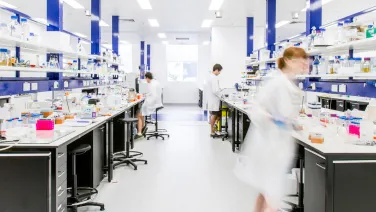My path to a PhD in Immunology
Doing a PhD can be a long and difficult journey. Make sure you prepare yourself for the challenge and try to find a good support system to help you through the rough times.
I am currently doing a PhD in Immunology at the John Curtin School of Medical Research. This will be my final year after four years of research in the lab. In short, my project involves investigating how processes in the immune system can be affected by a mutation in a protein, leading to sickness in a patient.
Medical research typically involves the use of lab mice. I realise that using animals for research can be a contentious issue but there is so much about the immune system we have yet to uncover. The mutation I am studying was initially identified in a patient, which we have now successfully genetically replicated in a mouse model. This allows us to investigate how this single mutation alters the immune system of a living creature. Observing these changes in the context of a functioning immune system is something we cannot replicate in a “test tube”. All research involving animals is reviewed and approved by a dedicated ANU Animal Ethics Committee. Researchers adhere to strict policies, which ensures the mice we use are provided with utmost care and the animals are not in distress or suffering.
Prior to commencing my studies at ANU, I undertook my undergraduate degree in the Philippines and worked in a clinical diagnostic lab in Singapore. Working in that lab environment provided me with exposure to an array of fascinating equipment and technologies, leading to the realisation that I wanted to learn more and expand my horizons. This brought me to ANU where I completed a Master of Biotechnology (Research), which I enjoyed so much that I stayed on and am now completing a PhD.
ANU students are very fortunate to have access to high-end facilities and resources. For example when I was studying in the Philippines, many under-resourced labs used bleach to clean and reuse disposable equipment to reduce costs. This really makes me appreciate what we often take for granted here in Australia, especially in scientific research.
If you are considering undertaking a PhD, my advice is to think hard about it before making any decisions. Do not start one just because you do not know what else to do after graduation – but do it because you are genuinely interested in, and have a passion for the topic. Doing a PhD can be mentally, emotionally and physically draining, however, the training and life skills it provides can be very rewarding. If you do decide to pursue a PhD, remember to maintain a work-life balance. Always take notes when doing experiments—write everything down (your future self will thank you later). Practice a lot of self-care and surround yourself with supportive people to keep you sane.
Kristy is a current ANU student. She is currently in the fourth year of her PhD at the John Curtin School of Medical Research.
Originally published on Faces of ANU.


